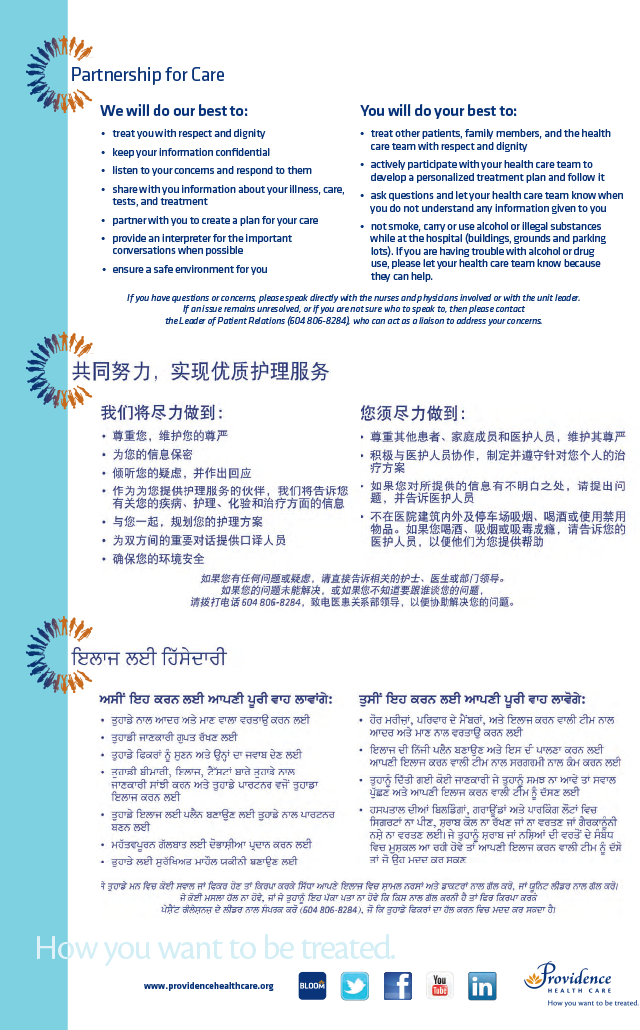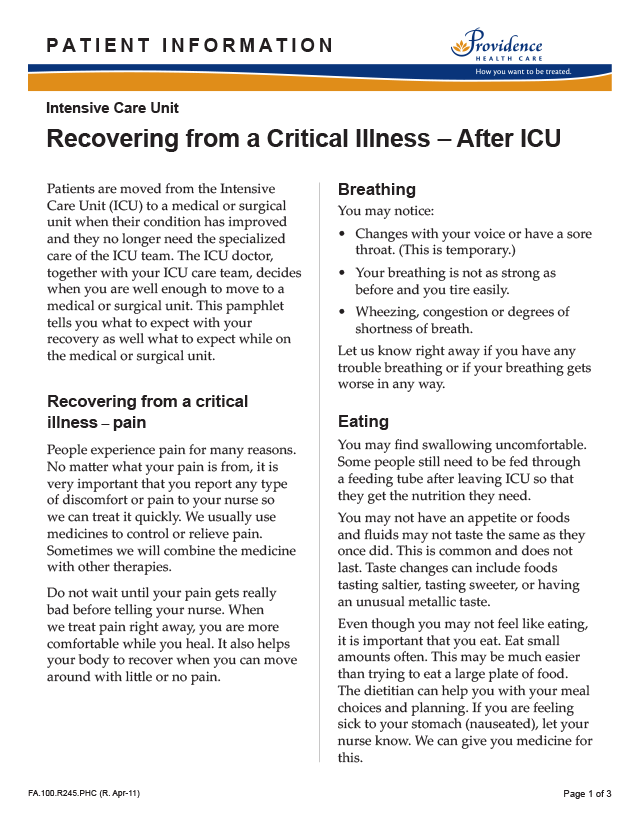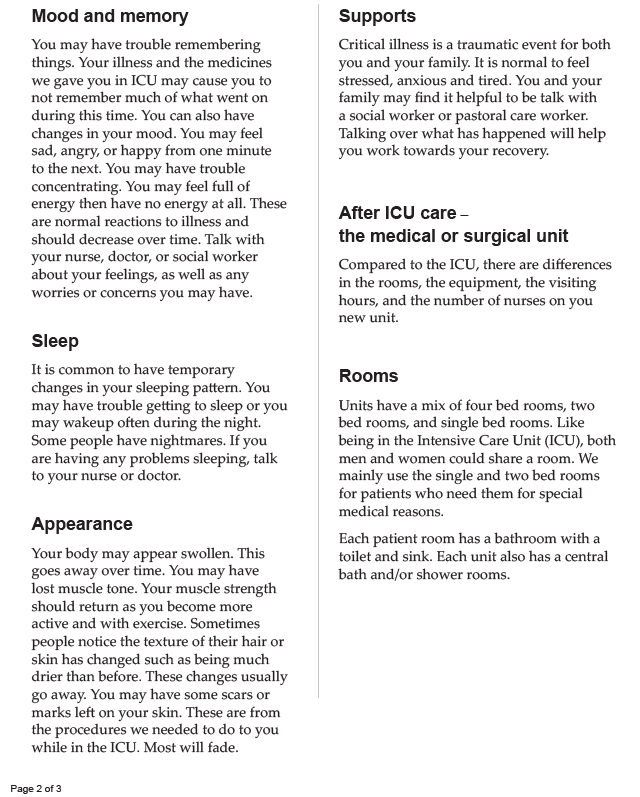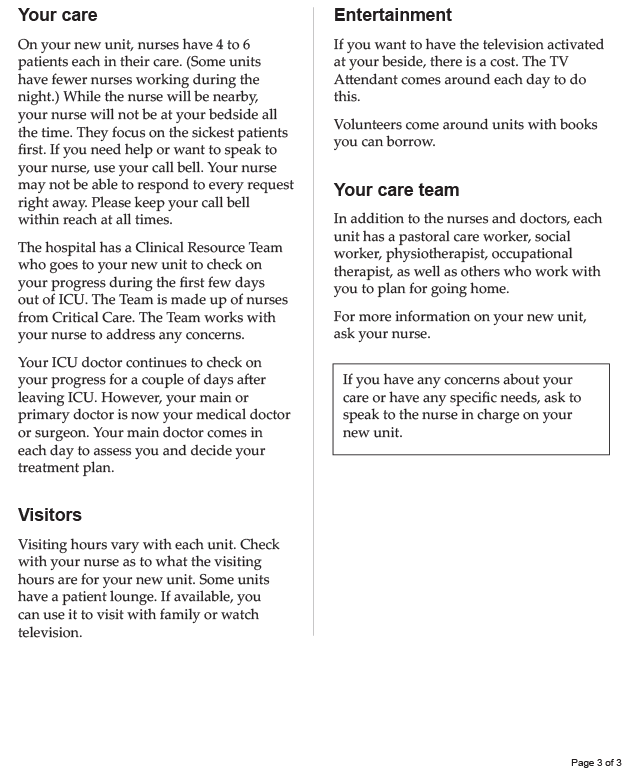Patient Rights & Safety
Patients who take part in their own care do better and stay safer. Simple tips that will help make your hospital stay a positive experience:
Help stop the spread of germs: practice good hand hygiene
- Wash your hands before:
- Eating and drinking
- Touching any cuts, sores or bandages
- Touching your eyes, nose or mouth
- Leaving your room
- Wash your hands after:
- Using the toilet
- Blowing your nose
- Touching any cuts, sores or bandages
- Touching garbage
- We encourage you to ask your doctor, nurse or other health care staff if they have just cleaned their hands, prior to interacting with you.
- Do not share food, personal care items or cigarettes with other patients.
- Cough and/or sneeze into a tissue. If you do not have a tissue to cover your cough or sneeze, please do so into your elbow. DO NOT cough or sneeze into your hand.
- Do not go into other patient’s rooms.
- Keep your bedside area tidy. Do what you can to keep yourself clean.
- We encourage your family and visitors to get immunized to help us prevent illness.
Wear your identification bracelet
Make sure the information on it is correct. You may have more than one band on. Please do not remove as these are there for your safety (e.g., allergy alerts).
Agreeing to treatment
Talk to your health care team regarding your health concerns, medical conditions and medications. Depending on the treatment you need, we may ask you to sign a form that says we can treat you, called “Consent to Treatment.” Make sure you read and understand everything on the form before you sign it.
If you have trouble hearing, or if English is not your first language, please ask for an interpreter regarding medical conversations. Remember you can change your mind about treatment at any time.
Medications
If you have any questions regarding your medications, ask us. Make sure you tell us about all medications you are taking and any allergies or reactions you might have.
Unless we tell you it is okay, do not take any medications you have brought from home. Know the side effects of the medications you are taking and what to do if you have any problems.
Keep your belongings safe
Keep your glasses, hearing aids and dentures in a labelled case.
Please send your jewelry and important belongings home.
If you do not have anybody to give your belongings to, we can lock up small items in the hospital safe. Any cash valued greater than $20 should be sent to the hospital cashier for safekeeping. Talk to the nursing staff to arrange this. For valuables that you need to keep with you, PHC is not responsible for any lost items.
Help prevent slips and falls
- Wear slippers with rubber soles or non-skid socks.
- Ask for help when getting out of bed, especially at night. If we say you can get out of bed and walk on your own, make sure you have enough light to see where you are going. If we tell you to only get up with help, use your call bell and wait until someone can help you.
- Ask your nurse to make sure that your bed is at the lowest position.
- Let your nurse know if you are finding it hard to walk with equipment, such as an intravenous (IV) pole.
- If you cannot reach something, ask someone to move it closer for you.
- If you need a walking aid (e.g., wheelchair, walker, cane, or crutches), one of our physiotherapists can help arrange for this.
Blood clots: What you need to know
Sometimes, patients can get a blood clot in the veins of their legs just from lying in bed. If the clot breaks off, it can “travel” into the lungs, making it hard to breathe. Tell us right away if you notice any of the following:
- Swelling, throbbing, cramping, or redness in your leg or calf
- Pain in your leg when you stand or walk
- Being suddenly short-of-breath for no reason
- Sudden chest pain that feels sharp or gets worse when you take a deep breath
- Coughing up blood
- Heart racing, especially if you feel dizzy or faint
To prevent blood clots:
- Drink as much water as you are allowed to drink
- Move around as much as you are allowed to or as you are able to move around
Understand your instructions for when you go home:
Here are some tips to follow for a safe and successful transition home:
- Ask about your care at home and make sure you understand what to do.
- Ask for information in writing regarding how to care for yourself after you leave the hospital.
- Find out about any follow-up visits with your doctor or other appointments.
- Make sure you can read new prescriptions and can understand the medication labels.
- Learn about the side effects of your medications.
Hospital safety
We do not allow anyone to smoke, drink alcohol or use illegal drugs anywhere on hospital property, including the grounds and parking lots. If you need help to stop using these substances while in the hospital, talk to any member of your health care team.
Process for transferring patients out of the ICU:
The Intensivist deems if the patient is stable enough to transfer to the general ward. A bed request is ordered in Sunrise Clinical Manager (SCM) and the patient is transferred when there is a bed available.





